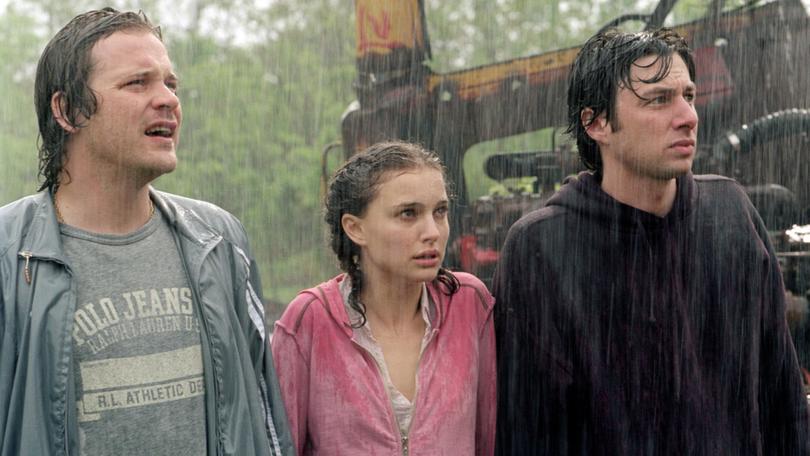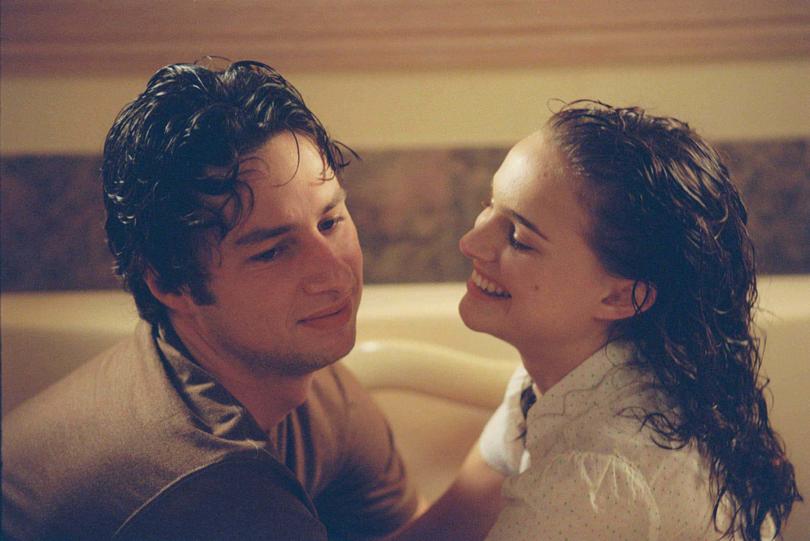The Garden State soundtrack killed, the movie, not so much
Zach Braff’s Garden State hasn’t held up very well over the past 20 years but its iconic soundtrack still absolutely kills.

The 20th anniversary of anything always make you feel old.
Can it really be two decades since Janet Jackson and Justin Timberlake scandalised with that wardrobe malfunction at the Super Bowl? Or since Jennifer Hawkins won Miss Universe? Or that infamous handshake that cost Mark Latham the election?
If you run through some of the movies that were released in 2004 — Mean Girls, The Day After Tomorrow, Sideways, 13 Going on 30, Aviator, Napoleon Dynamite, Eternal Sunshine of the Spotless Mind — none of them feel like they were from 20 years ago.
Sign up to The Nightly's newsletters.
Get the first look at the digital newspaper, curated daily stories and breaking headlines delivered to your inbox.
By continuing you agree to our Terms and Privacy Policy.They’ve stuck around in the cultural consciousness so it feels like not-quite-yesterday but surely no more than 10 years ago?
Garden State, which marked 20 years this week, certainly didn’t achieve the high points of its contemporaries. Its story about a depressed out-of-work actor returning home to New Jersey had the illusion of depth but was actually quite a bit cringe and indulgent of manbabies.

It had all the cliches of a self-congratulatory indie movie. No list of Manic Pixie Dream Girls (quirky, fun and without any purpose other than to say something about the male lead character) is complete without Natalie Portman’s character.
But what does stand up — and has grown bigger than the movie itself — is its music. The Garden State soundtrack absolutely killed. Braff even won a Grammy Award for it as its compilation producer.
Garden State producer Dan Halsted recently told The Ringer that Braff was able to convince all the artists to sell permission for the use of their songs in the film for between $US2500 to $US5000, when the going rate was 10 times as much.
The track listing included Coldplay’s Don’t Panic, Simon & Garfunkel’s The Only Living Boy in New York, Colin Hay’s I Just Don’t Think I’ll Ever Get Over You, an Iron & Wine cover of The Postal Service’s Such Great Heights, Frou Frou’s Let Go and, significantly, two songs from The Shins – Caring is Creepy and New Slang.
You have to remember where we were in 2004. It was a time when the alternative rock of the 1990s had given way to indie-rock, indie-pop and soul. Alicia Keys was topping the charts, Franz Ferdinand won the Triple J Hottest 100.
Sure, the pop mavens such as Jessica Simpson and Beyonce were huge, but music wasn’t dominated by one genre or Taylor Swift.
None of the songs on the Garden State soundtrack will ever likely be used in a viral TikTok dance, but it gave sensitive “cool” kids chill-out anthems to rally around and buy into the idea they were different and individualistic.

Even though, like most identities, it would coalesce on an agreed-upon list of markers such as craft beer, farmers markets, loving under-appreciated TV shows such as Arrested Development, and reading The New Yorker or Frankie magazine.
All the traits that would later be lovingly mocked by blogs such as Christian Lander’s Stuff White People Like.
One of the biggest small bands to benefit from the Garden State soundtrack was The Shins, a Portland-based indie rock band fronted by James Mercer and signed to Subpop, the record label that first inked Nirvana.
The Shins’ New Slang was a crucial moment in the film when Braff’s Andrew says to Portman’s Sam: “You gotta hear this song, it’ll change your life”. It certainly changed The Shins’ lives.
Mercer told The Ringer: “It was a terrific surprise when it was a hit movie and famous people were in it and it wasn’t just another indie movie that kind of disappears.
“Finally it was a boon to us because he gave us money from the sales of the soundtrack, and it sold a lot. It certainly outsold anything we had put out ourselves.
“It changed my life.”

New Slang had been released on the 2001 Oh, Inverted World album but after Garden State, The Shins also sold another half a million copies of it.
It wasn’t only Garden State though. The OC, which had premiered the year before, had also become a significant promoter of indie music.
One of its key characters, Seth Cohen (Adam Brody), was designated as a music tastemaker. When Seth declared on the biggest teen show of the era that he loves Death Cab for Cutie, The Shins, Modest Mouse and Bright Eyes, millions of young people were listening.
The series released six official soundtracks, which featured the likes of The Killers, Alexi Murdoch, Spoon, The Walkmen, Sufjan Stevens and Jem. Before today’s generation discovered Kate Bush’s Running Up That Hill on Stranger Things, The OC had a cover of the same by Placebo.
It was a way for fans to discover a band that wouldn’t be guaranteed radio play or TV ads. In a pre-social media ubiquity era, it was a boon for indie music which soon became mainstream music.
Halsted added: “It’s an ongoing joke in my family that pretty much every elevator I get into, you hear some song from the Garden State soundtrack — or the muzak, which is even worse.”
The success of it led Paul Simon to add Only Living Boy in New York back into the rotation of his live shows.
Braff recently reminisced to The Ringer: “This was back in an era where people actually listened to a full album, as opposed to just picking tracks like we do on streaming these days.”

